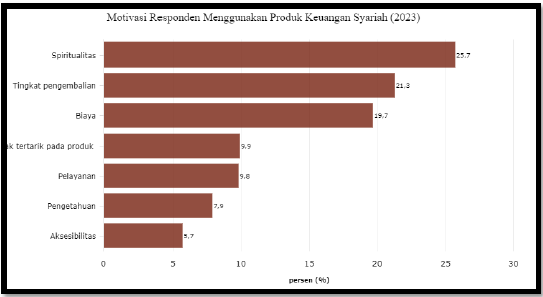
Submission to VIJ 2023-11-10
Keywords
- Empowerment, Community Economy, Sharia Fintech
Copyright (c) 2023 Ahmad Munir Hamid, Syuhada, Iskandar Ritonga

This work is licensed under a Creative Commons Attribution 4.0 International License.
Abstract
Fintech Syariah is an innovation that has the potential to strengthen the Islamic economy by providing more inclusive and syariah-compliant access to financial services. This article provides comprehensive literature on how Islamic finance technology benefits Muslim economies. Using a variety of literary analyses, this article explains how Fintech Syariah may increase access to money, provide innovative solutions for social and economic problems, and reduce the risk associated with financial inception. We also outline the necessary regulatory measures that must be taken to ensure that Islamic economic principles are adhered to in Fintech. The current study provides insight into how Fintech Syariah may become a significant tool for Muslim economic development, with implications that are particularly significant for the growth of the Islamic economy in the current digital era.
References
- Amijaya, Rachmania Nurul Fitri. 2019. “Pengaruh Inklusi Keuangan Terhadap Pertumbuhan Ekonomi Di Negara Organisasi Kerjasama Islam (Oki).”
- Anon. 2015. “Islamic Microfinance.” Islamic Finance : Instruments and Markets (February). doi: 10.5040/9781472920379.0039.
- Ascarya, A., and A. Sakti. 2022. “Designing Micro-Fintech Models for Islamic Micro Financial Institutions in Indonesia.” doi: 10.1108/imefm-05-2020-0233.
- Ayu, Fuis Sukma, and Dian Filianti. 2022. “Determinants of Financial Inclusion Information Disclosure of Islamic Rural Banks in Indonesia.”
- Azrak, Tawfik, and Muzamil Edema. 2022. “The Role of Islamic and Conventional Microfinance in Tackling Financial Exclusion in Bangladesh, Nigeria, and Uganda.” Shirkah: Journal of Economics and Business 7(2):113–23. doi: 10.22515/shirkah.v7i2.478.
- Darmawan, Andre Pupung, A. Erlando, Dwi Budi, and Santoso. 2023. “Examining an Islamic Financial Inclusivity and Its Impact on Fundamental Economic Variables in Indonesia (An Approach of Static Panel Data Analysis).”
- Eldomiaty, Tarek, Rasha Hammam, and Rawan El Bakry. 2020. “Institutional Determinants of Financial Inclusion: Evidence from World Economies.” International Journal of Development Issues 19(2):217–28.
- Fahlevi, Mochammad, and Annuar Md Nassir D. O. 10. 1080/23322039. 2023. 220296. E. R. -. n.d. “No Title.”
- Ginanjar, Adhitya, and Salina Hj Kassim. 2021. “Roles of Islamic Microfinance Institutions in Improving Financial Inclusion in Indonesia: Empirical Evidence from Baitulmaal Wa Tamwil.” Al-Iqtishad: Jurnal Ilmu Ekonomi Syariah 13(1):87–108. doi: 10.15408/aiq.v13i1.19842.
- Gortsos, Christos V, and Vasilis Panagiotidis. 2017. “Financial Inclusion: An Overview of Its Various Dimensions and Its Assistance in Reducing Private Sector Insolvency.” Pp. 363–93 in Financial Inclusion: An Overview of Its Various Dimensions and Its Assistance in Reducing Private Sector Insolvency. Springer International Publishing.
- Hassan, M. Kabir, Ammar Jreisat, Mustafa Raza Rabbani, and Somar Al-Mohamed. 2022. “Islamic Fintech and Bahrain: An Opportunity for Global Financial Services.” FinTech in Islamic Financial Institutions 65–87. doi: 10.1007/978-3-031-14941-2_4.
- Hassouba, Taghreed Abdelaziz. 2023. “Financial Inclusion in Egypt: The Road Ahead.” Review of Economics and Political Science. doi: 10.1108/REPS-06-2022-0034.
- Hejazziey, Djawahir. 2015. “THE ESTABLISHMENT OF ISLAMIC BANKING LAW IN POLITICAL PERSPECTIVE.”
- Herispon, Herispon. 2019. “PENDEKATAN INKLUSI KEUANGAN DAN TEORI PERILAKU TERENCANA DALAM ANALISIS PERILAKU UTANG.”
- Hudaefi, Fahmi Ali. 2020. “How Does Islamic Fintech Promote the SDGs? Qualitative Evidence from Indonesia.” doi: 10.1108/qrfm-05-2019-0058.
- Jayanthi, M., and S. S. Rau. 2017. “Financial Inclusion in India.” International Journal of Applied Business and Economic Research 15(22):11–16. doi: 10.12724/ajss.53.3.
- Jones, L. 2018. “Guest Editorial: Poverty Reduction in the FinTech Age.” doi: 10.3362/1755-1986.2018.29-2.ED.
- Kanta. n.d. “Financial Inclusion Perspective of Reserve Bank of India.”
- Mandira Sarma, Jesim Pais. 2011. “Financial Inclusion and Development.” Pp. 613–28 in Challenges in Economic and Financial Policy Formulation. Palgrave Macmillan.
- Mehboob ul-Hassan, and M. Usman. n.d. “Building the Entrepreneurship Through Non -Banking Institution: An Empirical Study on the Contribution of GEAR for Economic Development in Islamic Way.”
- Ozili, Peterson K. 2023. “Can Social Inclusion Policies Promote Financial Inclusion?” International Journal of Sociology and Social Policy (116971). doi: 10.1108/IJSSP-03-2023-0054.
- Pati, U., Pujiyono Pujiyono, and Pranoto Pranoto. 2021. “Sharia Fintech as a Sharia Compliance Solution in the Optimization of Electronic-Based Mosque’s Ziswaf Management.” doi: 10.22304/PJIH.V8N1.A3.
- Pu, Ruihui, D. Teresienė, Ina Pieczulis, Jie Kong, and Xiao-Guang Yue. 2021. “The Interaction between Banking Sector and Financial Technology Companies: Qualitative Assessment—A Case of Lithuania.” doi: 10.3390/RISKS9010021.
- Sari, Elizabeth Amelia Permata. 2022. “Peran Fintech Syariah Dalam Ekonomi Islam Di Indonesia.” Prosiding National Seminar on Accounting, Finance and Economics (NSAFE) 2(2):122–32.
- Sari, yunita resmi, Ika Tejaningrum, Asep Ramdan, Hamidatul Imamah, and dara ayu Lestari. 2016. “Kajian Peningkatan Akses Keuangan Kelompok Masyarakat Atau Pelaku Usaha Melalui Pemanfaatan Produk / Jasa Layanan Keuangan Syariah.” Indonesia Bank 1–82.
- Savaşan, Fatih, and Salih Ulev D. O. 10. 1016/j. bir. 2023. 01. 01. E. R. -. n.d. “No Title.”
- Sen, G. 2019. “Gender Equality and Women’s Empowerment: Feminist Mobilization for the SDG S.”
- Soemitra, Andri. 2018. Peran Pemberdayaan Masyarakat Oleh Lembaga Keuangan Mikro Syariah Dalam Perspektif Sustainable Development Goals (SDGs).
- Sugiyono. 2017. Metode Penelitian Kuantitatif, Kualitatif, Dan R&D. Bandung : Alfabeta, CV.
- Tajamul Khurshid Bhat, and Imtiyaz Hussain Ganaie. n.d. “Financial Inclusion: A Primary Study on District Anantnag with Special Reference to J&K Bank.”
- Widyandri, Dahayu Bethari, and Nisfu Laila. 2022. “ANALISIS PENGARUH MOBILE BANKING DAN KEUANGAN INKLUSIF TERHADAP KINERJA KEUANGAN BANK SYARIAH DI INDONESIA PERIODE 2014-2019.”
- Yusop, Zulkornain, and Muzafar Shah Habibullah D. O. 10. 1108/ijoe. 11-2021-1751 E. R. -. n.d. “No Title.”
- Zitouni, Takwa, and Khoutem Ben Jedidia. 2022. “Does Islamic Microfinance Contribute to Economic Empowerment in Tunisia?: A Case Study of Zitouna Tamkeen.” Journal of Business and Socio-Economic Development 2(1):67–81. doi: 10.1108/jbsed-10-2021-0143.
- Zulkhibri, Muhamed. 2016. “Financial Inclusion, Financial Inclusion Policy and Islamic Finance.” Macroeconomics and Finance in Emerging Market Economies 9(3):303–20.